Postdoctoral Research Fellow
This position is with the QUT Centre for Robotics (QCR) and will work closely with me in the Visual Learning and Understanding research program.
This position has been filled and is no longer available.
About the Position
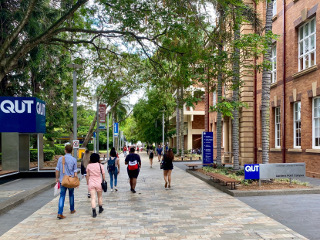 We are looking for a creative and enthusiastic Research Fellow to contribute decisively to our Visual Learning and Understanding research program. You will be a key member of the QUT Centre for Robotics and will work closely with academics, other research fellows, engineers, and our PhD students.
We are looking for a creative and enthusiastic Research Fellow to contribute decisively to our Visual Learning and Understanding research program. You will be a key member of the QUT Centre for Robotics and will work closely with academics, other research fellows, engineers, and our PhD students.
You should be excited to do pioneering research and work on novel ways a robot can reliably interpret its environment and build an internal representation of its surroundings (e.g. through semantic object-based SLAM); or how a robot could using reinforcement learning to learn comlex tasks from a semantic object-based map.
You are driven to investigate how machine learning for visual perception can be made safe, trustworthy, and reliable; how robots can understand and represent the geometry, semantics, and functionality of their surroundings and the task-relevant objects therein; and how robots can use this internal representation and learn to decide or plan their next actions in order to accomplish a useful task in a safe way.
Potential research directions at a glance:
- semantic object-based SLAM,
- reinforcement learning using semantic object-based maps for complex task learning,
- reliable deep learning for visual perception in open world conditions
You are willing to explore the applicability of your research in a variety of robotic application domains including domestic robotics, healthcare, retail, logistics, autonomous driving, agriculture, but also in adjacent domains such as augmented/mixed reality.
During your undergraduate degree or in your previous roles as researcher and PhD student, you have demonstrated expertise and understanding of the foundations of robotics, such as coordinate frames and transforms, navigation, localisation, mapping, SLAM, kinematics, motion models, and control. You are familiar with the mathematical concepts underpinning those foundations, including statistics and probabilistic methods.
You have deep knowledge in computer vision (including current approaches to visual object detection, semantic segmentation, and instance segmentation) and general machine learning, as well as a good understanding of reinforcement learning. You understand the mathematical and statistical foundations of deep learning.
You are a prolific user of Python and deep learning frameworks such as PyTorch, and regularly work and develop in Linux. Ideally, you have a working knowledge of C/C++ and ROS. You understand current approaches to visual object detection, semantic segmentation, instance segmentation, and how to use them.
Ideally, during your PhD you have acquired expert knowledge in visual SLAM or structure from motion, deep learning, and robotic vision. You should have published in the leading conferences in robotics, computer vision, or machine learning.
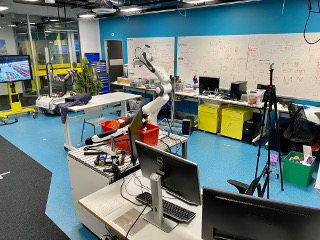
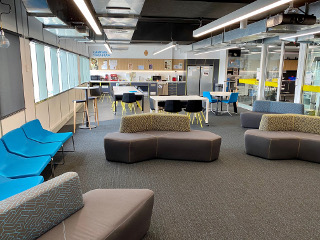
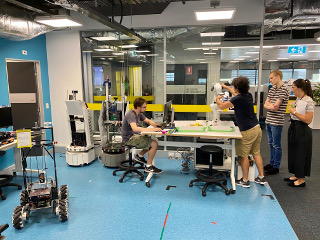
About Us
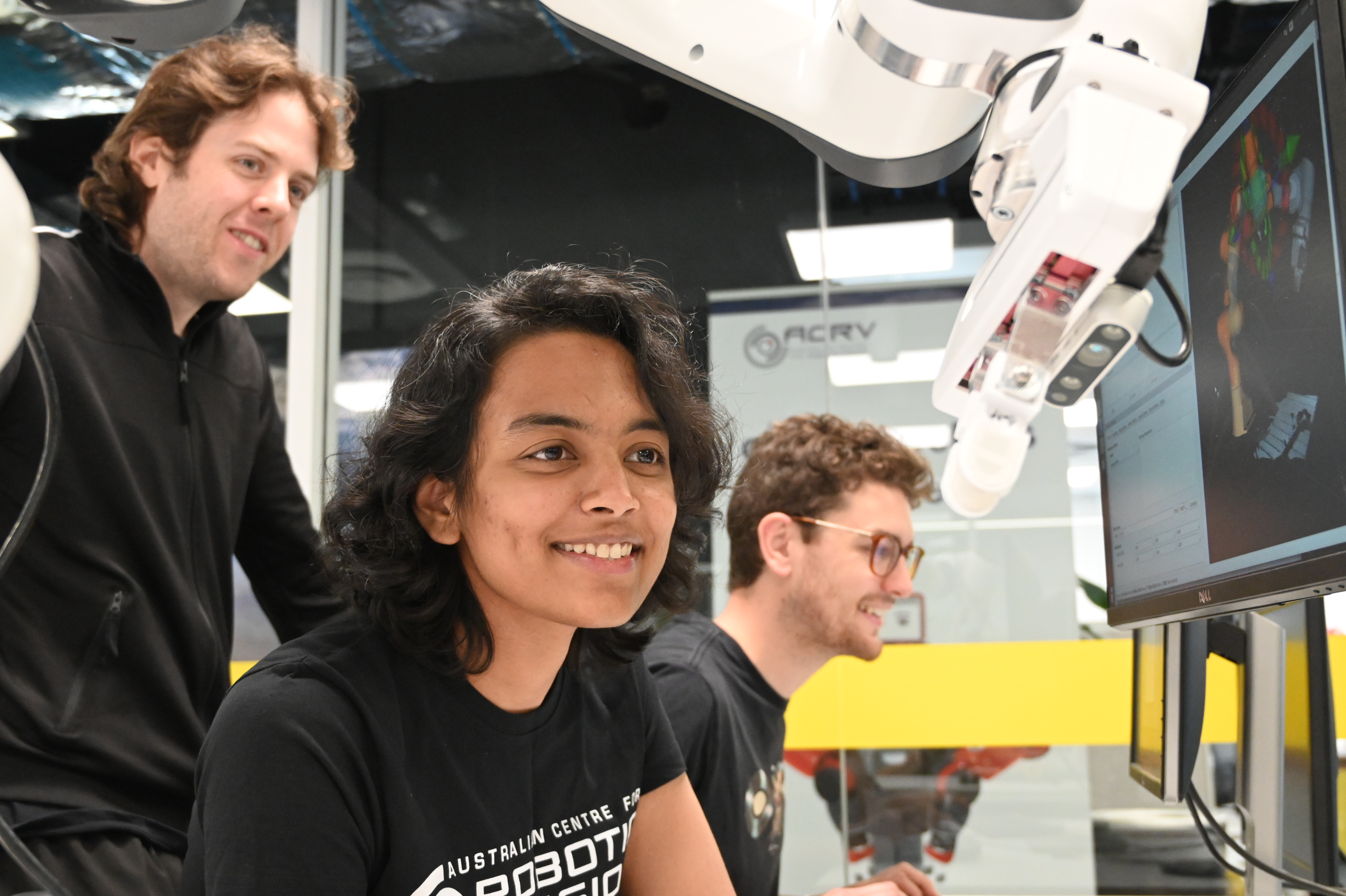 The QUT Centre for Robotics (QCR) conducts at-scale world-leading research in intelligent robotics; translates fundamental research into commercial and societal outcomes; is a leader in education, training and development of talent to meet growing demands for expertise in robotics and autonomous systems; and provides leadership in technological policy development and societal debate. Established in 2020, the Centre has been built on the momentum of a decade’s investment in robotic research and translation at QUT which has been funded by QUT, ARC, Queensland Government, CRCs and Industry. QCR comprises over 100 researchers and engineers.
The QUT Centre for Robotics (QCR) conducts at-scale world-leading research in intelligent robotics; translates fundamental research into commercial and societal outcomes; is a leader in education, training and development of talent to meet growing demands for expertise in robotics and autonomous systems; and provides leadership in technological policy development and societal debate. Established in 2020, the Centre has been built on the momentum of a decade’s investment in robotic research and translation at QUT which has been funded by QUT, ARC, Queensland Government, CRCs and Industry. QCR comprises over 100 researchers and engineers.
QCR researchers collaborate with industry and universities around the world, including MIT, Harvard and Oxford universities, Boeing, Thales, DST, Airservices Australia, CASA, JARUS, TRAFI, Google Deepmind, Google AI, Amazon Robotics, Caterpillar, Rheinmetall, US Air Force, and NASA’s Jet Propulsion Laboratory.
We are proud of our beautiful and big modern lab space and research environment. We have a fantastic collection of equipment to support your research, including many mobile robot platforms and robotic arms.
The Centre supports a flexible working environment. We support a diverse and inclusive atmosphere and encourage applications from women, Aboriginal Australians and Torres Strait Islander people.
About the Visual Learning and Understanding Program
The Research Fellow will be a key member of QCR’s Visual Learning and Understanding Program.
This program investigates the fundamental problem of how a robot can learn to reliably interpret its environment, and build an internal representation of its surroundings in order to decide on its actions. The program addresses research questions such as how machine learning for visual perception can be made safe, trustworthy, and reliable; how robots can understand and represent the geometry, semantics, and functionality of their surroundings and the task-relevant objects therein; and how robots can use this internal representation and learn to decide or plan their next actions in order to accomplish a useful task in a safe way.
Key Responsibilities
Key responsibilities include:
- Lead and contribute to research in QCR’s Visual Learning and Understanding Program
- Work closely with a team of academics, research fellow, engineers, PhD students and undergraduates
- Co-supervise PhD students and undergraduate students
- Publish in high-quality conferences and journals in robotics, computer vision, machine learning
- Actively participate and contribute to our collaborative culture within the Centre, including visits to Centre partners and joint publications
- Implementing and administering University policy within the Faculty with respect to equitable access to education and workplace health and safety
Selection Criteria
- Completion of a doctoral qualification in engineering, computer science, or related discipline.
- Experience in (or a willingness to take on) leadership of a research team within a high profile academic environment.
- A well-formulated research agenda and the willingness or demonstrated capability to independently conduct high-quality research.
- Demonstrated ability to publish research outcomes in top conferences or journals in robotics, computer vision, or machine learning.
- Demonstrated knowledge and expertise in the foundations of robotics, computer vision, machine learning. Demonstrated proficiency in Python and experience with ROS, deep learning frameworks such as PyTorch, Linux.
Type of Appointment
This appointment will be offered on a fixed term, full-time basis for (3) three years.
Remuneration and Benefits
This Research Fellow position is classified as Academic Level B (LEVB) which has an annual remuneration of $97,375 AUD to $115,886 AUD, plus 17% superannuation, plus 17.5% recreation leave loading.
QUT is a high quality and flexible organisation that is proud of its excellent employment conditions which include but are not limited to:
- Reduced working year scheme
- Parental leave provisions
- Study support encompassing leave and financial assistance
- Comprehensive professional development
- Salary Packaging
Location
Queensland University of Technology (QUT), Gardens Point campus, Brisbane, Australia. We are located on a beautiful campus next to the Brisbane City Botanic Gardens, just a few minutes on foot from the Brisbane CBD and the bustling Southbank cultural precinct with many fantastic restaurants and bars. QUT has excellent connections to public transport, including our CityCat river ferry, trains, and bus lines. A bike path along the river connects QUT with the nearby suburbs.
Brisbane is a very liveable sub-tropical city of 2.3M people and offers great opportunities for recreational activities ranging from hiking in the many nearby national parks, rock climbing (the Kangaroo Point crag is just across the river, and there are many of well-maintained sport crags in a 1-2 hour radius around Brisbane, as well as a selection of climbing and bouldering gyms in the city), surfing (the famous Gold Coast is just over one hour away), and all things beach and ocean related.